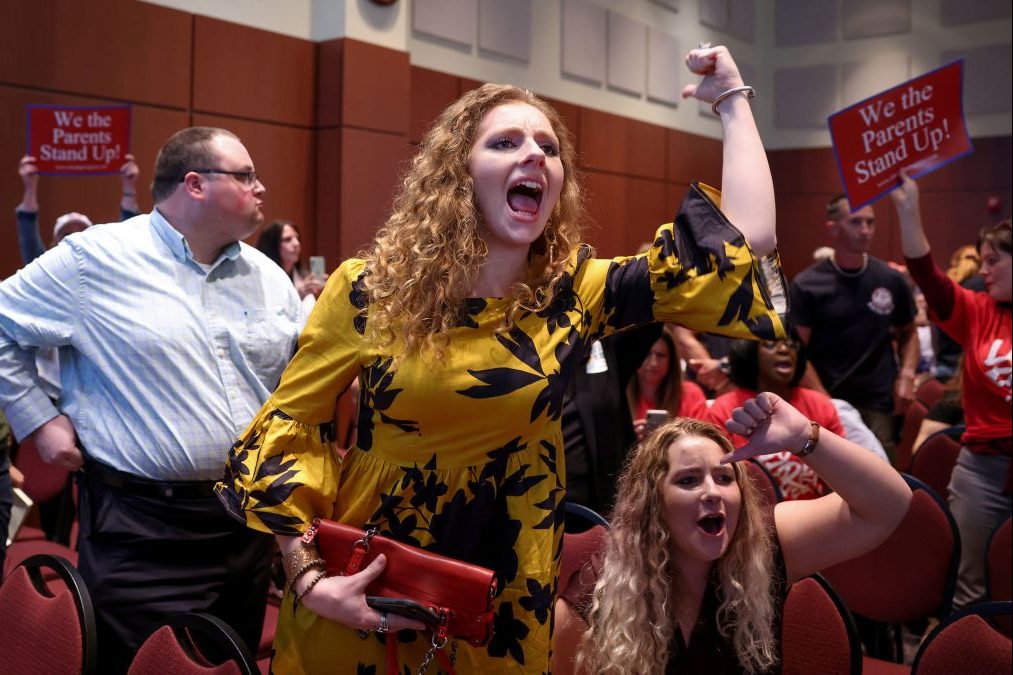Teachers Say Parents And Politicians Are The Leading Cause Of Their Stress
Educators discussed the leading cause of their teacher stress, and parents and politicians topped the list.

If you think that students are the greatest source of teacher stress, you’re wrong. According to survey data from Teachers Pay Teachers (TPT), politicians and parents are the real culprits. Nearly 40 percent of teachers ranked politicians as their top source of stress, closely followed by parents at 36 percent.
TPT is a popular online platform where teachers exchange lesson ideas and materials, and a good place to gather data from a wide sample of instructors. Other high-ranking teacher stress factors included social media, news reports on schools or teaching, school administrators, and school boards. At least in this survey, students didn’t make the list.
Exactly how do politicians put pressure on educators? John Waldron taught for 20 years at Booker T. Washington High School in Tulsa, Oklahoma, then became a state legislator in 2018. His pull into politics was driven by utter exhaustion over politician-driven teacher stress. In a four-part series shared on Education Week, Waldron discussed his experiences.
“Politicians cut education budgets everywhere, leaving teachers with larger class sizes and fewer resources, even as new education standards increased workloads. In my state of Oklahoma, teachers went a decade without a raise. All too many of them left the state or the profession to provide for their families.”
John Waldron
The mass exodus of teachers from the profession is a nationwide trend, which has significantly increased due to teacher stress. In Los Angeles, nearly all teachers are seriously considering quitting. When that many people are abandoning a career they worked hard to achieve, it’s imperative that leaders at every level begin to address the issues.
Parents must also examine how they are contributing to levels of teacher stress high enough to push educators to the breaking point. Understandable passion over their children’s educational outcomes often pairs with unrealistic expectations to create a hostile environment. Dr. Annie McKee, the Director of the Penn GSE’s Chief Learning Officer Executive Doctoral Program, calls the parent-teacher relationship “precious and complicated.”

“It’s precious because of the potential for a partnership that supports our children’s learning, their development, and their lives. It’s complicated because it’s a “hot” relationship charged with love, commitment, hope, dreams, fears, righteousness, frustration, power dynamics, and, sometimes, fury,” said McKee on parents and their relationship with teacher stress. “Parent-teacher relationships are also complicated because the conversations parents and teachers have are often at the center of many complex and–sadly—broken social systems that impact schools and kids. Add to this the fact that many parents see teachers as having too much power over them and their kids, and that many teachers feel ill-equipped to deal with the issues they face in their schools, districts, and even their classrooms.”
Surprisingly—or not?—the effect of each source of teacher stress varies depending on where teachers live and work. This is because states have different approaches to teacher autonomy, curriculum restrictions, and more. The political climate in an area also influences how much people value their local schools and instructors.
The TPT data found that teachers in southern states experienced the lowest satisfaction with the level of autonomy they had over choosing what and how to teach. Southern educators also cited a lack of respect as a contributor to teacher stress. Additionally, over half of all instructors nationwide felt that state and school district restrictions over particular issues and curricula contributed to the current educator exodus.
Politicians can begin to make up for their contribution to teacher stress by fostering genuine relationships with local educators and supporting efforts to improve teacher mental health. Good leaders seek to understand the people they influence and welcome their input on how government can improve. Politicians bear the burden of starting these potentially difficult conversations and following through on promises to make the state of education better.
Parents can lower teacher stress levels by maintaining a good positive attitude towards school. Moms and Dads should plan ahead before talking to their child’s teachers and approach interactions with a calm, non-judgmental perspective. It’s easier to point blame at a teacher than to look inward and examine personal prejudices and experiences that may color the ability to view things objectively. Empathy and teamwork go a long way in fostering positive parent-teacher and teacher-politician relationships.



